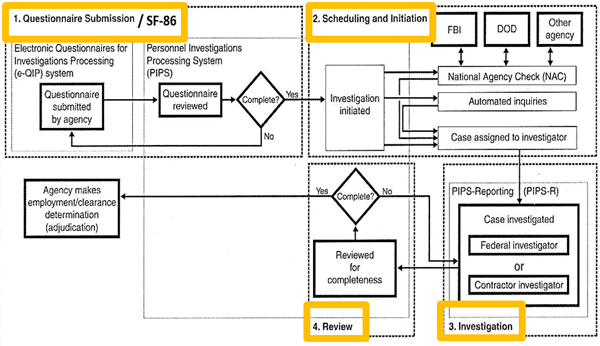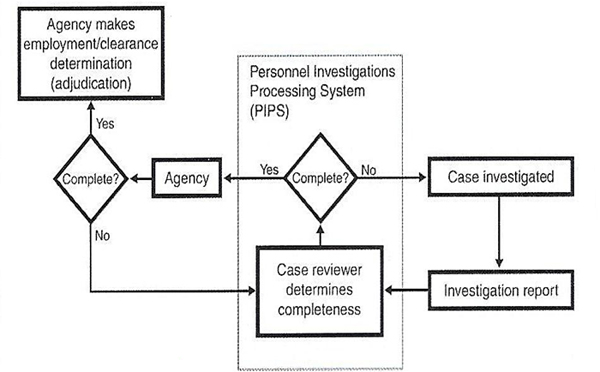Completed Security Investigation How Long Does It Take to Be Reviewed
SF-86 Questionnaire
The SF-86 Questionnaire is a 127 folio questionnaire-form necessary for national security positions in the United states of america.
Your SF-86 Questionnaire is supposed to go on through the system every bit shown below. 90 pct of all cases are supposed to be completed in approximately 60 days. (forty days allotted for the Investigation Stage and 20 days for the Adjudication Phase.)
In reality, depending on the type and complexity of the security investigation requested, many cases take much longer than the targeted goal of 60 days.
Primal Steps in FIS's Groundwork Investigation Process

Submitting the SF-86
Your SF-86 Questionnaire needs to be checked and reviewed very carefully at this 1st stage. If your paperwork is accurate and complete, your investigative case can canvass correct through the system.
Conversely, if your paperwork is sloppy, inaccurate and incomplete, your case will take forever! Why? Because you were as well lazy to make full out the forms correctly. Now you take created extra piece of work for the case analysts and reviewers, investigators and adjudicators. Investigators tin get a glimpse of what type of person you are just by merely looking at how y'all filled out your SF-86.
Scheduling and Initiation
Electronic record checks are conducted and the results are scanned or uploaded into the PIPS* system. Scannable inquiries are mailed out to sources also.
PIPS automatically assigns case to a field office. The SAC will assign the example to an investigator(s.) The investigator(due south) volition have the results of your electronic record checks on hand during the course of your background investigation, including your personal Subject Interview.
*PIPS is a FISD computer software system containing xv million background investigation records of federal employees, military personnel and contractors. The software is used for the automatic entry, scheduling, case command and endmost of background investigations. Reports of Investigation (ROI) are generated and managed through a part of PIPS called PIPS-R (reporting).
Investigation
You'll be contacted by a FISD investigator or a contract investigator. You actually never know which one you will get.
The investigator will conduct your personal Bailiwick Interview. He/she will besides interview your supervisors, co-workers, neighbors, friends and various other types of people.
The investigator will type up your instance on his/her laptop and transmit the case through the PIPS organization to FIPC in Boyers, PA.
Case Review
When all of the investigative field work has been completed and transmitted to FIPC, your investigative report volition be reviewed by a Case Reviewer. The Case Reviewer ensures that the investigative product meets all official and legal standards established by OPM.
If data is missing, the instance is sent back to the investigators for correction. If your case is deemed complete, your report is sent to the requesting agency (your agency or prospective bureau.)

Adjudication
Arguably, the most important part of the entire federal security clearance process. The professional careers and personal lives of individuals & their families are at pale. This is a very serious phase of the security clearance process and should not be taken lightly.

Everyone Adjudicate to the Aforementioned Standards
All executive branch CAFs adjudicate PSIs using the same national security standards, found in the Adjudication Guidelines for Determining Eligibility for Access to Classified Data, which were issued pursuant to Executive Order 12968, "Access to Classified Information," dated August 2, 1995. These national security adjudicative guidelines were revised in December 2005.
The thirteen DOD Adjudicative Guidelines
- Allegiance to the U.s.a.
- Strange Influence
- Foreign Preference
- Sexual Behavior
- Personal Bear
- Financial Considerations
- Alcohol Consumption
- Drug Involvement
- Psychological Conditions
- Criminal Comport
- Handling Protected Information
- Exterior Activities
- Misuse of Information Engineering science

The 14 OPM Adjudicative Guidelines
- Booze
- Drugs
- Finances
- Criminal Beliefs
- Honesty
- Confusing or Violent Behavior
- Employment Misconduct
- Firearms or Weapons Offense
- Miscellaneous
- Debarment
- Loyalty
- Qualifications
- Assembly
- Relatives
Each Guideline is comprised of three parts:
- The Concern
- The Concern is a uncomplicated argument that sets along the concerns the security community has about each Adjudicative Guideline.
- Potentially Disqualifying Conditions
- The Potentially Disqualifying Atmospheric condition are conditions that, if present in the bidder's life, may potentially disqualify him or her for eligibility or admission.
- Mitigating Factors
- The Mitigating Factors are used past adjudicators to remainder against the Potentially Disqualifying Conditions. The Mitigating Factors consist of conditions that, if present in the applicant's life, may cancel or lessen the severity of the Potentially Disqualifying Conditions.
Reciprocity
All federal agencies that grant eligibility to classified information must recognize and have investigations and security eligibilities carried out by other branches of the federal government – provided those investigations meet the scope and standards required for the new position. Reciprocity applies to all civilian employees of the federal government, members of the military and contractors. Non just is reciprocity required by government policy, but information technology can save significant time and money. People volition exist able to start their new jobs right away and their new agencies won't waste taxpayer dollars conveying out costly and unnecessary investigations.

For reciprocity to apply, an private'due south new position cannot crave a higher eligibility than he or she currently possesses. In addition, the date of the private's terminal investigation must fall within the required timeline and the existing eligibility must not have been granted on an interim or temporary basis, or by status, deviation or waiver. Finally, if the position has Special Access Program, or SAP requirements, the eligibility may be accepted reciprocally, but the specific program may not be able to grant SAP access. Several policies provide more specific guidance on reciprocity within the DoD. Reciprocity for DoD Employees is outlined in DoD 5200.2-R and reciprocity for DoD Contractors is described in DoD 5220.22-Grand (the NISPOM).
DoD Employees: Personnel Security Investigations for DoD employees must be accepted reciprocally as long every bit the investigation is inside scope and the employee doesn't accept a break in War machine Service or Federal employment longer than 24 months.
DoD Contractors : For contractor employees, preexisting Personnel Security Clearances or PCLs, must be accepted, provided the investigation for the PCL meets or exceeds the scope requirements for the new position, there is no new derogatory data about the employee and eligibility was granted without condition, deviation or waiver.
In add-on to classified access eligibility, reciprocity also applies to both Common Access Carte or CAC credentialing and to Suitability adjudications. As established past E.O. 13467, previous suitability determinations must be accepted reciprocally, as long equally they meet or exceed the suitability requirements of the new position. Requests for reciprocal credence of eligibility are candy at the DoD Consolidated Adjudications Facility or DOD CAF. Reciprocity requests are normally processed within two days. Eligibility Determinations for DoD employees should besides be accepted, as long as there is no new derogatory information about the employee and eligibility was granted without condition, deviation, or waiver.
Remember, reciprocity is not only a suggestion – it is a requirement outlined in numerous government policies including several Executive Orders, the Intelligence Reform and Terrorism Prevention Human activity of 2004, the Director of National Intelligence Memorandum, "Executive Order 13467 and Reciprocal Recognition of Existing Personnel Security Clearances," and other policy guidance.
E.O. 12968: "Access To Classified Information" (7 August 1995) Defines conditions where reciprocity must be practiced and conditions that allow for the denial of reciprocity. IRTPA: Intelligence Reform and Terrorism Prevention Act of 2004 (IRTPA) (17 December 2004) Establishes guidelines for reciprocity and requires reciprocity between authorities agencies. E.O. 13467: "Reforming Processes Related to Suitability for Government Employment, Fitness for Contractor Employees, and Eligibility for Access to Classified National Security Data" (two July 2008) Ensures alignment of security and suitability investigative and adjudicative processes.
DNI Memo: Director of National Intelligence Memorandum "Executive Order 13467 and Reciprocal Recognition of Existing Personnel Security Clearances" (one October 2008) Streamlines and emphasizes processes that ensure the reciprocity of security clearances. Due east.O. 13488: "Granting Reciprocity on Excepted Service and Federal Contractor Employee Fitness and Reinvestigating Individuals in Positions of Public Trust" (16 January 2009) Aligns reciprocity between Security Clearance determinations and Public Trust determinations. Boosted Policy Guidance:
- OMB Memoranda to Executive Departments and Agencies: "Reciprocal Recognition of Existing Personnel Security Clearances" (12 December 2005, 17 July 2006, and fourteen November 2007)
Source: https://www.dcsecurityclearanceconsultants.com/sf-86-questionnaire.php